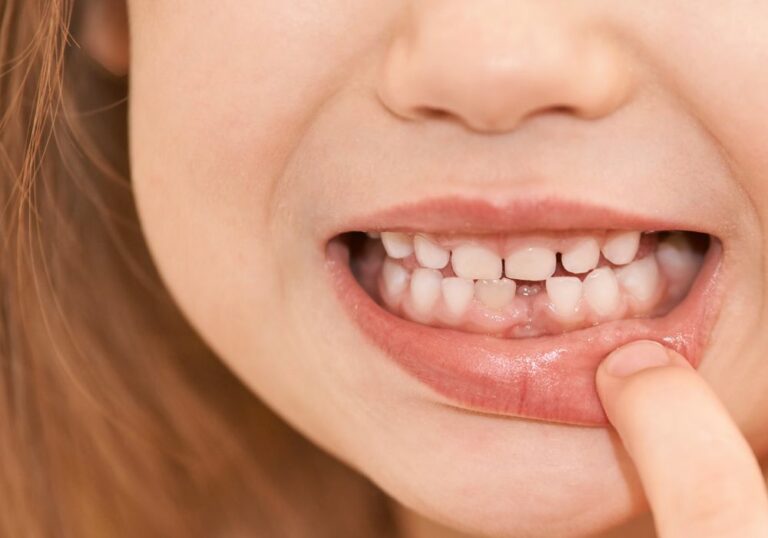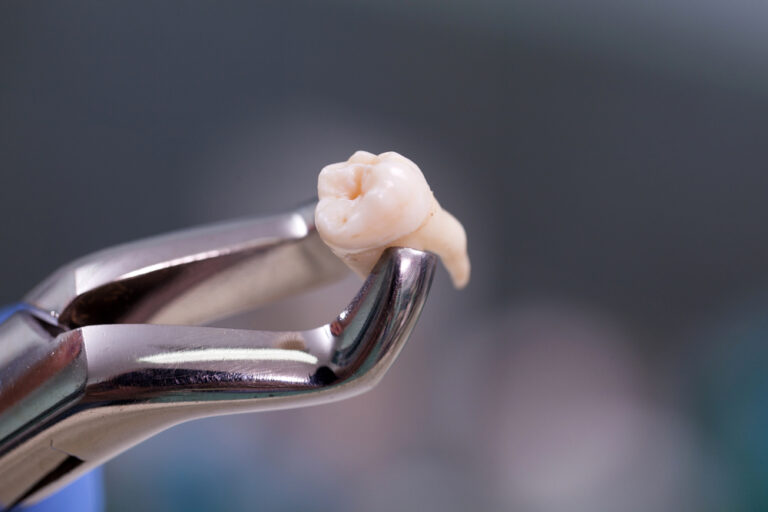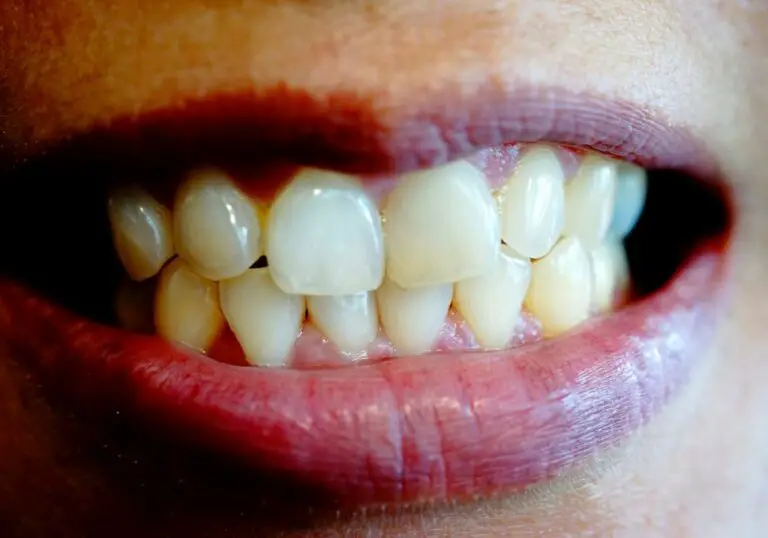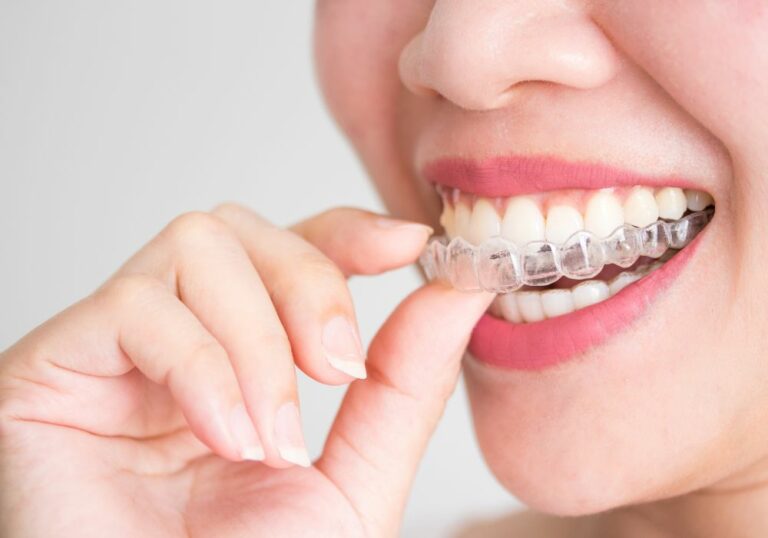Fluoride is an important mineral that plays a key role in dental health and cavity prevention. Fluoride helps strengthen and protect tooth enamel, the outer layer of the teeth. It also aids in remineralization, the process of restoring minerals lost from the enamel due to acid attacks. Many toothpastes and mouthwashes contain fluoride as an active ingredient for these reasons.
When you brush your teeth at night with a fluoride toothpaste or use a fluoride mouthwash, you’ll have residual fluoride left on your teeth. You may wonder if it’s okay to leave that fluoride on your teeth overnight, or if you need to thoroughly rinse it off before bed.
Leaving fluoride on teeth overnight has certain benefits, as the fluoride can continue to strengthen and remineralize enamel while you sleep. However, there are also some potential risks in certain situations. In this comprehensive article, we’ll take an in-depth look at the pros and cons of leaving fluoride on your teeth overnight. We’ll also provide tips from dental professionals on how to gain the most from fluoride while limiting any risks.
How fluoride protects teeth?
Before discussing overnight fluoride use, it helps to understand how fluoride works to protect and strengthen tooth enamel. Fluoride protects teeth in several key ways:
- Strengthening enamel – Fluoride gets incorporated into the crystalline structure of hydroxyapatite, the main mineral in enamel. This forms a stronger, more acid-resistant mineral called fluorapatite.
- Remineralization – Fluoride attracts calcium and phosphate ions in saliva to rebuild initial enamel lesions and reverse early decay. This repairs weakened areas and ‘remineralizes’ enamel.
- Inhibiting bacteria – Fluoride interferes with enzyme functions in oral bacteria at high concentrations. This slows the growth of caries-causing bacteria like Streptococcus mutans.
- Reducing acid production – Fluoride also lowers the ability of bacteria to produce acids that dissolve tooth enamel.
Together, these protective mechanisms make fluoride a key weapon against tooth decay. Having an ongoing presence of fluoride is important both day and night. Next, we’ll discuss the advantages of leaving some fluoride on teeth overnight.
Benefits of leaving fluoride on teeth overnight
Leaving some residual fluoride toothpaste or mouthwash on your teeth overnight provides extended contact between the fluoride and enamel. This can enhance the protective effects:
Strengthening tooth enamel
When fluoride is present in the oral environment, it continually gets incorporated into hydroxyapatite crystals in enamel, making them more resistant to acid dissolution. Having fluoride on the teeth overnight means this restructuring process can continue providing strength benefits for hours while you sleep.
Studies show fluoride is most readily taken up into enamel at lower pH levels. The gradual decrease in pH that occurs overnight as saliva flow decreases allows for greater enamel fluoride uptake compared to daytime when pH is higher.
Preventing demineralization
Dental caries and cavities begin with early demineralization of enamel crystals by acidic byproducts of bacteria. This starts slowly with diffuse mineral loss, even before a visible cavity forms. Having fluoride present helps prevent and limit demineralization by attracting available calcium and phosphate to rebuild enamel.
Overnight is a critical period of low saliva flow where this protective effect is most important. Saliva naturally neutralizes and clears some acid, so less saliva at night means teeth are more vulnerable. Fluoride on the enamel continues preventing demineralization even as saliva decreases.
Reducing dental caries
Regular use of topical fluoride is proven to reduce dental caries progression. Fluoride limits caries by strengthening enamel against acid dissolution, promoting remineralization and inhibiting cariogenic bacteria. Having an ongoing supply of fluoride, including overnight while teeth are most at risk, is important to best moderate caries activity.
Studies consistently show that routine fluoride use reduces dental decay rates. One systematic review found that fluoride toothpaste alone decreases caries by 24% over non-fluoride pastes. The caries-preventive effect is enhanced by maximizing fluoride contact time.
Supporting enamel remineralization
In addition to preventing mineral loss, fluoride also aids in rebuilding and repairing areas of early demineralization before cavities form. The fluoride in saliva attracts available calcium and phosphate to re-harden softened enamel. This remineralization process depends on having an adequate presence of fluoride.
Again, nighttime is a critical window where remineralization effects are needed most, but saliva flow decreases. Residual fluoride left on the teeth continues promoting remineralization throughout the night.
In summary, having an ongoing reservoir of topical fluoride is beneficial for fortifying enamel against caries progression, both day and night. Fluoride strengthens enamel, curtails demineralization, and fosters remineralization most effectively when maintained at a constant therapeutic level. Overnight retention provides this sustained supply.
Potential risks of leaving fluoride on teeth overnight
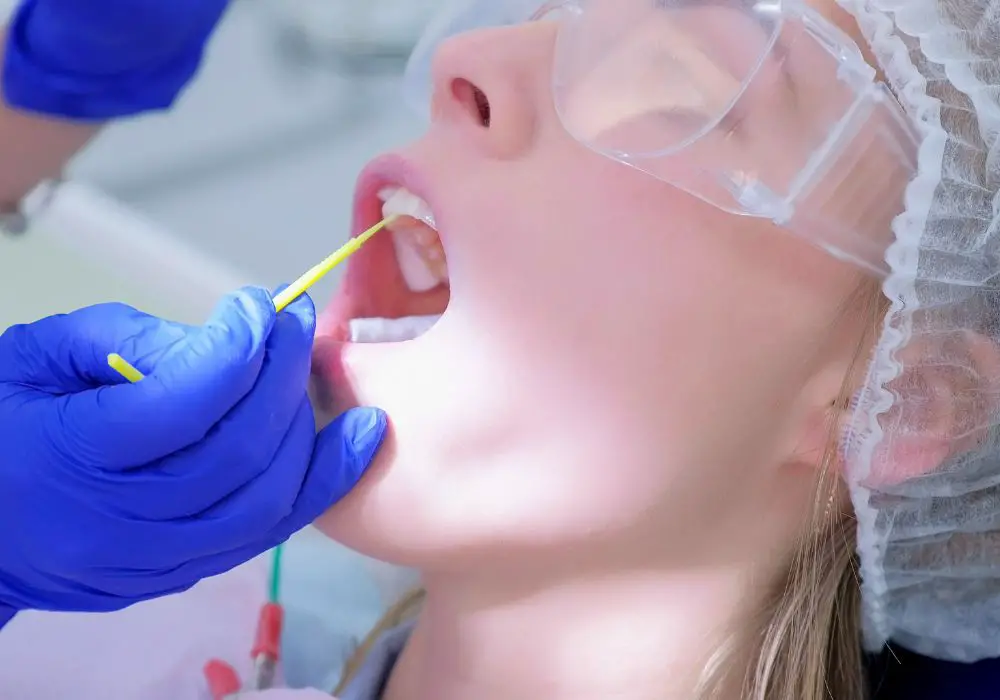
While ongoing topical fluoride offers advantages, leaving fluoride overnight does come with some possible risks in certain circumstances. It’s important to consider both benefits and potential risks when determining what’s best for your teeth.
Fluorosis
Dental fluorosis is a change in the mineralization of tooth enamel that results from excessive systemic fluoride intake. It occurs when children ingest higher than optimal amounts of fluoride while teeth are still developing under the gums.
In mild forms, fluorosis appears as barely detectable white specks on teeth. Moderate forms cause more noticeable white streaks, spots, or discoloration. Severe fluorosis results in pitting, malformation, and brown stains on enamel.
Some research indicates that swallowing too much fluoride toothpaste during childhood brushing may contribute to fluorosis. Leaving a lot of paste in the mouth overnight could exacerbate this risk, as residue is more likely to be swallowed.
However, fluoride toothpaste alone is rarely the sole cause of dental fluorosis. Multiple fluoride sources like drinking water, food, and supplements also play a role. But some children may be more susceptible, so overnight exposure merits caution.
Acute toxicity
In very rare cases, chronically ingesting too much fluoride can progress to acute toxicity. This can result in nausea, vomiting, diarrhea, increased salivation, and other symptoms. Mild acute toxicity may start above 5 mg fluoride ingested per day for young children.
While swallowed toothpaste residue overnight could theoretically contribute to these effects, acute fluoride toxicity is exceedingly uncommon. Severe cases usually result from accidental overingestion of fluoride supplements or inappropriate use of high-concentration dental products.
Oral irritation
Occasionally, leaving a highly concentrated layer of fluoride on the teeth or gums overnight could cause temporary irritation or inflammation of oral tissues in sensitive individuals. Chemical irritation is more likely when using strong prescription fluoride products. But it may occur in some cases with regular over-the-counter pastes or rinses if left on too thickly.
Dental professionals sometimes observe gingivitis or mucosal reactions from extended contact with high-percentage fluoride gels or varnishes during or after professional treatments. The mild irritant effect usually subsides within a day or two after the fluoride is cleared.
Allergic reactions
Rarely, some individuals may experience signs of allergy after using fluoride products. Documented symptoms typically involve skin reactions like rashes, hives, or dermatitis rather than oral symptoms. But for those with a known fluoride allergy, leaving fluoride overnight could possibly trigger increased local irritation and inflammation.
For most people, fluoride toothpaste or rinse left overnight does not cause any reaction or noticeable side effects. But it’s useful to be aware of the potential for fluoride overexposure. Risks mainly exist for younger children or with improper use of highly concentrated sources.
Tips for using fluoride overnight safely
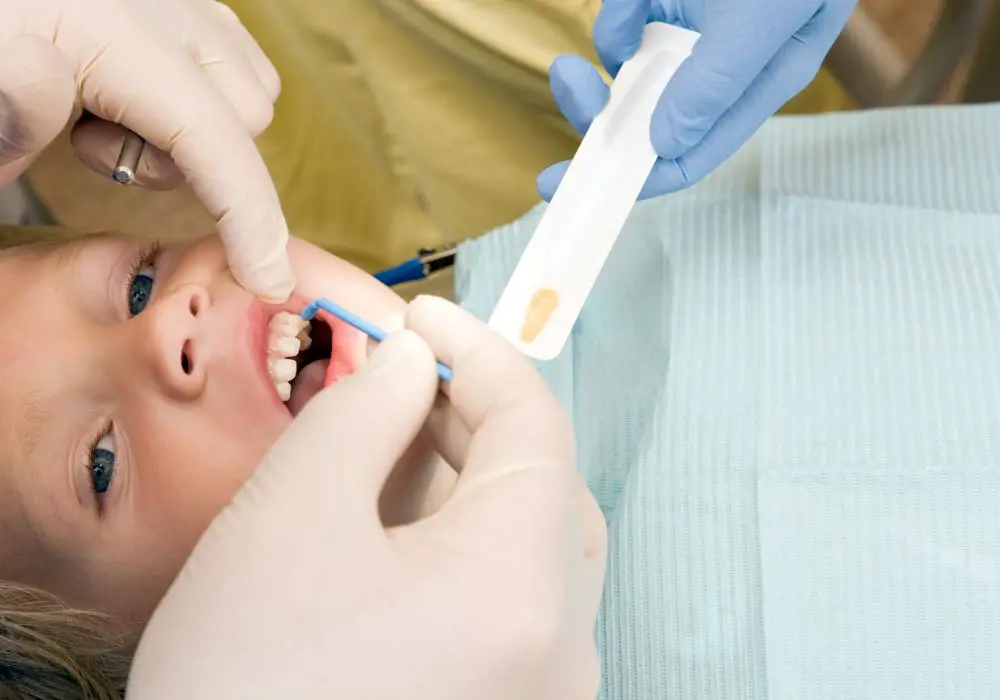
When used correctly, leaving topical fluoride on teeth overnight can safely maximize the protective benefits for many people. Here are some tips for gaining the advantages while minimizing risks:
- Use only a pea-sized smear of regular fluoride toothpaste on your brush at night. Avoid filling the bristles or using excessive amounts.
- If using prescription strength 5000+ ppm fluoride toothpaste, use only a rice-grain smear and no more than twice per week unless advised by your dentist.
- When using over-the-counter fluoride mouthwash, dilute it by mixing one part rinse with one part water before swishing. This reduces the concentration.
- After brushing, spit out as much excess toothpaste foam as possible instead of rinsing with water. This leaves just a thin film of fluoride on teeth.
- Teach children to spit out toothpaste rather than swallowing it. Monitor brushing to ensure they don’t ingest too much.
- Wait until after age 8 to leave fluoride paste overnight on children’s teeth. The fluoride swallowing risks are greatest for developing teeth.
- If your child is at high risk for tooth decay, talk to your pediatric dentist first about the appropriateness of leaving fluoride overnight.
- If you experience any symptoms of irritation in the mouth after leaving fluoride on teeth overnight, rinse thoroughly with water and discontinue the practice if irritation persists.
- Drink water after brushing at night if you have dry mouth or take medications that reduce saliva flow. This provides hydration without washing away protective fluoride.
Using these precautions, most healthy individuals beyond early childhood can achieve a preventive benefit from topical fluorides overnight without problems. However, patients with significant dry mouth, oral irritations or any concerns should discuss proper use with their dentist.
Fluoride treatment recommendations from dental organizations
In addition to precautions for home use, professional dental groups have provided science-based recommendations for fluoride treatments to safely maximize decay prevention:
American Dental Association (ADA)
- Brush twice daily with fluoride toothpaste. Use only a small smear for children under 3 years.
- Consult your dentist before introducing fluoride toothpaste to children under 2 years.
- Spit out toothpaste after brushing and avoid swallowing it, particularly for children under 6 years.
- Consider prescribing higher strength fluoride toothpaste for patients at high risk of tooth decay.
- Apply fluoride varnish treatments in-office for children under 6 years showing signs of decay.
American Academy of Pediatric Dentistry (AAPD)
- Prescribe fluoride supplements only for children with high risk for tooth decay who drink fluoride-deficient water.
- Avoid fluoride supplements between age 6 months to 3 years due to fluorosis risk.
- Use professional judgment for fluoride supplements in children age 3 to 16 based on caries risk and fluoride exposure.
CDC Division of Oral Health
- Expand community water fluoridation to provide optimal fluoride levels and combat tooth decay.
- Use school-based fluoride mouth rinse programs for children in areas without adequate community water fluoride.
- Educate parents not to allow children under 3 years to use fluoride toothpaste without supervision.
By following professional guidelines, you can feel confident that adding an overnight fluoride regimen to your oral care routine is safe for preventing cavities. But check with your dentist if you have any concerns.
Answers to common questions about overnight fluoride use
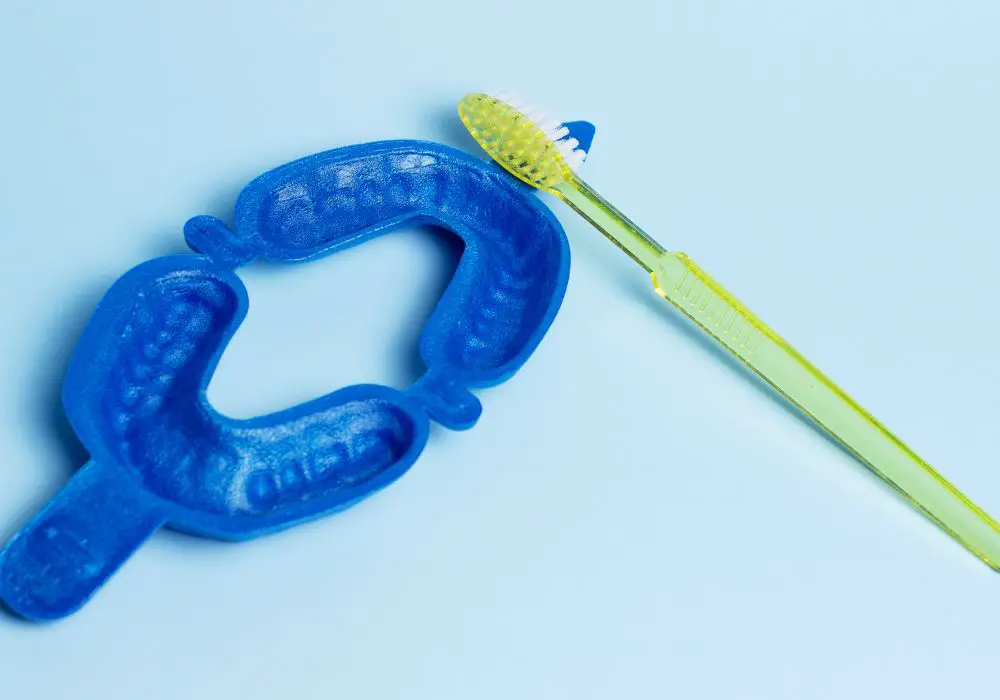
Here are answers to some frequently asked questions about leaving fluoride paste or rinse on teeth overnight:
Q: Is it safe to leave fluoride on my teeth overnight?
A: For most healthy adults and children over age 8, it is safe to leave a smear of regular-strength fluoride toothpaste on your teeth at night. This provides added decay protection. Take care not to use excessive amounts or let young children ingest too much fluoride paste.
Q: Can I just use fluoride mouthwash at night instead of brushing?
A: Using either fluoride toothpaste or an over-the-counter fluoride rinse alone will provide benefits overnight. But you should still brush at night to clean plaque from teeth. The best results come from brushing and diluted rinse together to leave maximum fluoride.
Q: Does leaving fluoride on whiten teeth or remove stains?
A: Unfortunately leaving regular fluoride toothpaste or rinse overnight does not have any tooth whitening effect. These products strengthen enamel but don’t change tooth color. You need to use separate whitening toothpastes or strips for stain removal.
Q: Is it harmful if I accidentally swallow some fluoride paste at night?
A: Incidentally swallowing small residual amounts of paste should not pose any health risks for adults. Try to avoid swallowing toothpaste, especially with young children. Frequent ingestion of fluoride paste could contribute to fluorosis in children under 8 years when enamel is still maturing.
Q: Can I use fluoride rinse full strength overnight?
A: Most dentists recommend diluting over-the-counter fluoride rinses in a 1:1 ratio with water when using as a longer overnight application. This reduces the concentration and prevents possible irritation or overexposure from leaving a strong rinse on the teeth and gums overnight.
Q: Should I rinse my mouth with water after brushing if I want fluoride remineralization benefits?
A: Avoid rinsing the mouth with water after brushing at night, as this will wash away protective fluoride left on your teeth. Simply spit out excess foam and leave the thin film on teeth to get the most remineralization and strengthening benefits overnight.
We hope these tips help you gain the most from your daily oral hygiene routine and overnight fluoride use. Be sure to consult your dentist with any other questions or concerns about maximizing fluoride for your dental health.
Conclusion
Leaving a small amount of fluoride toothpaste or diluted mouthwash on your teeth overnight can provide enhanced protection against tooth decay. The extended contact time with fluoride continues strengthening enamel, preventing demineralization, and fostering remineralization for hours while you sleep. This makes the most of fluoride’s effects.
However, you should use only a thin smear of fluoride paste and restrict overnight use for very young children under age 8 who are most susceptible to fluorosis. With proper precautions, routine use of topical fluorides overnight helps maintain an ongoing presence of fluoride to combat caries progression. For optimal dental health, fluoride is best used as part of a comprehensive preventive plan including brushing, flossing, dental visits and a healthy diet low in refined sugars.

